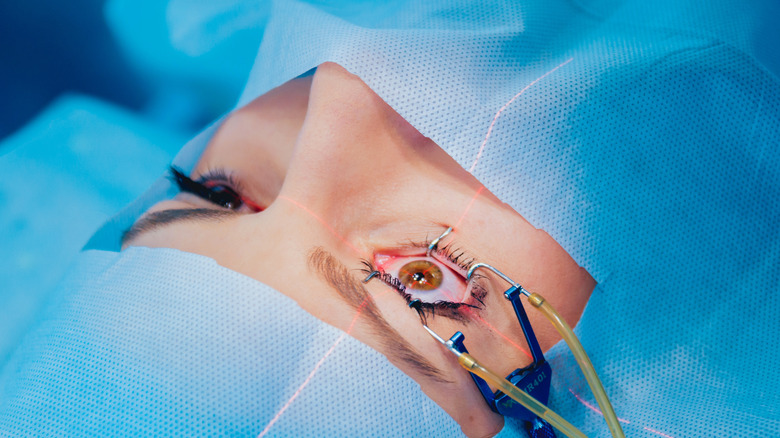Surprising Side Effects Of LASIK
LASIK surgery is a popular elective surgery performed in the United States, given that approximately 10 million Americans have had the procedure since FDA-approved in 1999 (via SeedScientific). That's an astounding number when you consider that nobody has to get LASIK; the conditions the surgery is designed to correct are already correctable with glasses or contact lenses. However, the life-changing appeal of scrapping corrective eyewear for good is a powerful draw.
The vast majority of LASIK patients — 96% — are satisfied with the results of their surgery and, as surgical technology has made the procedure safer and more precise, success rates have gone up, with fewer patients experiencing side effects from the procedure, per 2018 reporting cited in WebMD. Eric Donnenfeld, M.D., a former president of the American Society of Cataract and Refractive Surgery who has performed over 85,000 LASIK procedures, believes it is the "safest, most effective procedure that's ever existed in ophthalmology."
LASIK may produce surprising side effects
According to Verywell Health, in the first 24 to72 hours after surgery, it's common to experience a gritty, sandy feeling in the eyes, as well as mild pain, blurred vision, and light sensitivity. The weeks following surgery can also result in dry eyes and seeing glare or halos at night. These are normal and common side effects, and they usually resolve themselves within a few months of surgery.
In rare cases though, more serious side effects or unexpected outcomes can occur. Since the LASIK procedure involves destroying part of the cornea in order to reshape it, it's possible for nerve damage to occur in the cornea, causing intense pain (via WebMD). Also, while the majority of patients end up with 20/20 vision or better, not all do, and a very small number actually experience worse vision than they had before the surgery.
If you're considering LASIK, there are things you can do to ensure the best possible outcome. Research the procedure and find an experienced doctor who is willing to clearly explain the risks and benefits and answer all your questions without any sales pressure. Dr. Donnenfeld notes, "Some doctors are better than others. The single most important thing about LASIK is finding a good doctor to perform the surgery. Don't allow the surgical procedure to be commoditized," (via WebMD).


